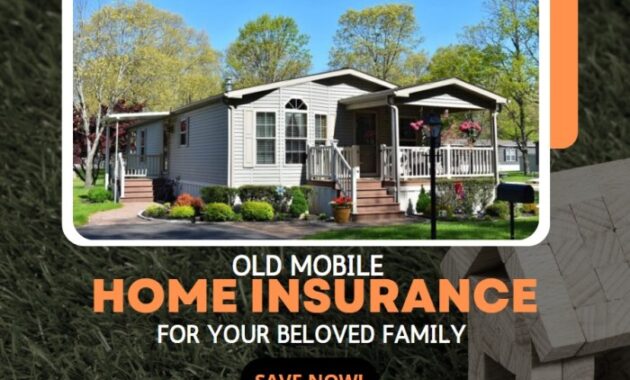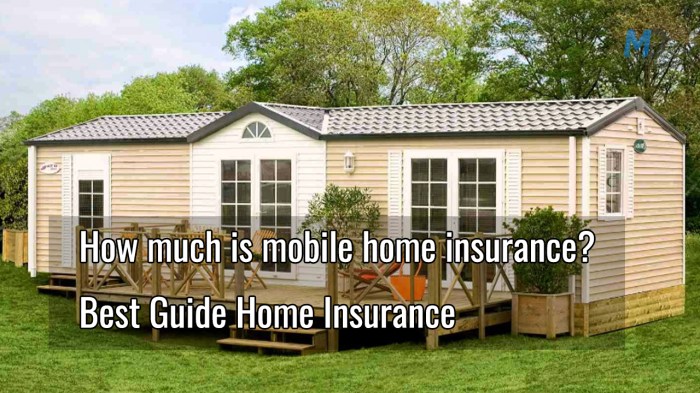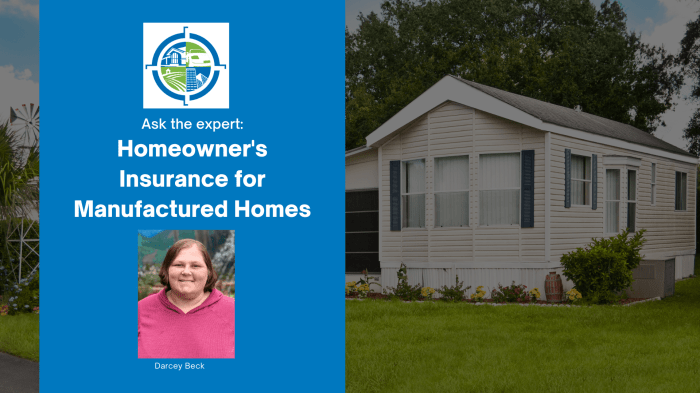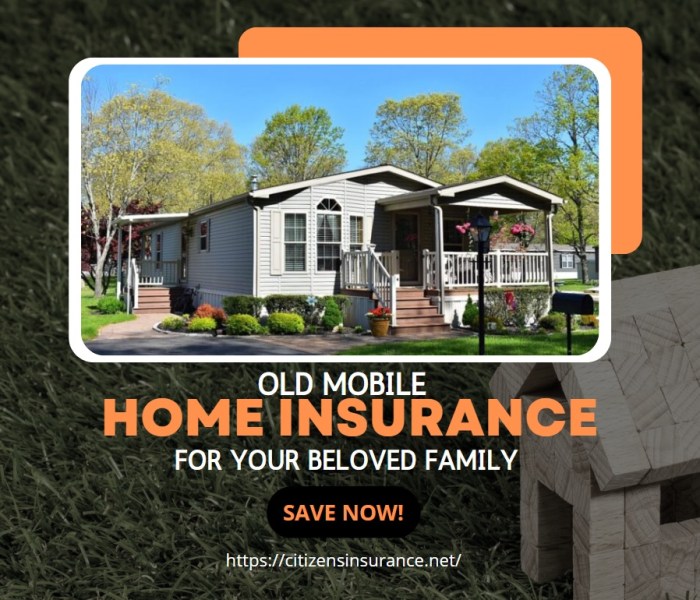
Owning a mobile home offers a unique blend of affordability and mobility. However, protecting this valuable asset requires a clear understanding of mobile home insurance coverage. This guide delves into the intricacies of securing adequate protection, exploring various policy types, cost factors, and crucial considerations for safeguarding your investment and peace of mind.
From understanding the different types of coverage available to navigating the claims process and implementing preventative measures, we aim to empower you with the knowledge necessary to make informed decisions about your mobile home insurance. We’ll also address common misconceptions and provide practical tips to help you find the best coverage at the most competitive price.
Factors Affecting Mobile Home Insurance Costs

Securing affordable mobile home insurance involves understanding the various factors that influence premium costs. Several key elements contribute to the final price you pay, and being aware of these can help you make informed decisions and potentially save money.
Location
Your mobile home’s location significantly impacts insurance costs. Areas prone to natural disasters like hurricanes, tornadoes, wildfires, or earthquakes will generally have higher premiums due to the increased risk of damage. For example, a mobile home situated in a coastal region susceptible to hurricanes will likely command a higher premium than one located in a less disaster-prone inland area. Similarly, areas with high crime rates may also result in increased premiums due to the higher risk of theft or vandalism. Insurance companies assess the risk associated with each location and adjust premiums accordingly.
Age of the Mobile Home
Older mobile homes typically cost more to insure than newer ones. This is because older models are more likely to have outdated safety features and are generally more susceptible to damage and wear and tear. The materials used in older homes may also be less resistant to severe weather events. For example, a mobile home built in the 1970s will likely have a higher premium than a comparable model built in the last five years, reflecting the increased risk of damage and repair costs.
Credit Score
Surprisingly, your credit score can influence your mobile home insurance premiums. Insurance companies often use credit scores as an indicator of risk. Individuals with lower credit scores are often perceived as higher risk and may face higher premiums. This is because a poor credit history might suggest a higher likelihood of late or missed payments on insurance premiums. Conversely, a good credit score can often lead to lower premiums as insurers view you as a more reliable customer.
Safety Features
Installing safety features in your mobile home can significantly impact your insurance costs. Features such as smoke detectors, burglar alarms, and wind mitigation devices (like reinforced roofs or straps) can demonstrate to insurance companies that you’re taking proactive steps to reduce risk. These safety measures can lead to lower premiums as they minimize the potential for damage and resulting claims. For instance, a mobile home equipped with a fire suppression system might receive a discount compared to a similar home without one.
Coverage Levels
The level of coverage you choose directly affects your insurance costs. Higher coverage levels, offering greater protection against damage or loss, naturally result in higher premiums. Conversely, opting for lower coverage limits will result in lower premiums but will leave you with less financial protection in the event of a significant loss. For example, comprehensive coverage, which protects against a broader range of incidents, will be more expensive than basic liability coverage.
| Factor | Low Impact on Price | Medium Impact on Price | High Impact on Price |
|---|---|---|---|
| Location | Inland, low crime area | Suburban area, moderate crime | Coastal area, high crime, disaster-prone |
| Age of Mobile Home | Less than 5 years old | 5-15 years old | Older than 15 years old |
| Credit Score | 750+ | 650-749 | Below 650 |
| Safety Features | Few or no safety features | Some safety features (smoke detectors, etc.) | Extensive safety features (alarm system, fire suppression) |
| Coverage Level | Basic liability | Standard coverage | Comprehensive coverage |
Filing a Claim for Mobile Home Insurance

Filing a claim after damage or loss to your mobile home can be a stressful experience, but understanding the process can help streamline things. This section Artikels the steps involved in filing a claim, ensuring you have the necessary documentation, and navigating interactions with your insurance adjuster. Remember, prompt action and clear communication are key to a successful claim resolution.
The claim process typically involves several key steps, each requiring careful attention to detail. Failing to follow these steps could delay or even jeopardize your claim.
Claim Reporting and Initial Documentation
After experiencing damage or loss to your mobile home, promptly contact your insurance provider. This initial contact should occur as soon as possible after the incident. You will need to provide basic information such as your policy number, the date and time of the incident, a brief description of the damage, and your contact information. It’s advisable to take photos and videos of the damage before moving or cleaning anything. These visual records are crucial for supporting your claim. Keep detailed records of all communication with your insurance company, including dates, times, and names of individuals you spoke with.
Providing Comprehensive Documentation
Following your initial report, your insurance company will likely request additional documentation. This may include:
- Completed claim form: This form will require detailed information about the incident, the extent of the damage, and any contributing factors.
- Proof of ownership: This might be your title or deed to the mobile home and land.
- Photos and videos: High-resolution images and videos of the damage from multiple angles are essential. These should clearly show the extent of the damage and any relevant details.
- Repair estimates: Obtain at least two estimates from reputable contractors for the necessary repairs or replacement.
- Police report (if applicable): If the damage resulted from theft, vandalism, or a covered accident, a police report is crucial evidence.
Thorough documentation significantly increases the likelihood of a smooth and successful claim process. Incomplete or missing documentation can lead to delays and complications.
Dealing with Insurance Adjusters and Negotiating Settlements
Once your claim is received, an insurance adjuster will be assigned to your case. The adjuster will investigate the damage, verify the information you provided, and determine the extent of the insurance coverage. Cooperate fully with the adjuster, providing any requested information promptly and accurately. It is helpful to schedule a time for the adjuster to inspect the damage in person. Be prepared to discuss the details of the incident and answer any questions the adjuster may have. During this process, maintain a professional and courteous demeanor.
Negotiating a settlement may involve discussions about the cost of repairs or replacement, as well as any applicable deductibles. If you disagree with the adjuster’s assessment, clearly explain your reasoning and provide supporting documentation. If a resolution cannot be reached amicably, you may need to consider alternative dispute resolution methods, such as mediation or arbitration.
Remember: Keep detailed records of all communication and agreements throughout the claim process.
Final Review

Ultimately, securing appropriate mobile home insurance coverage is a crucial step in responsible homeownership. By carefully considering the factors influencing cost, understanding policy limitations, and actively implementing preventative measures, you can protect your investment and ensure your financial security. Remember to compare providers, ask questions, and choose a policy that aligns with your specific needs and budget. Your peace of mind is invaluable.
FAQs
What is the difference between mobile home and traditional homeowners insurance?
Mobile home insurance policies often have different coverage structures and considerations compared to traditional homeowners insurance due to the unique nature of mobile homes and their potential for damage or relocation.
How often should I review my mobile home insurance policy?
It’s recommended to review your policy annually or whenever there are significant changes in your circumstances, such as home improvements or changes in your financial situation.
Can I insure my personal belongings separately from my mobile home?
Yes, many policies offer separate coverage for personal belongings (contents coverage), allowing for tailored protection of your personal possessions within the mobile home.
What happens if my mobile home is damaged beyond repair?
In the event of a total loss, your insurance policy will typically provide coverage up to the insured value of your mobile home, subject to your policy’s terms and conditions. This might involve receiving a payout to replace or repair the home.